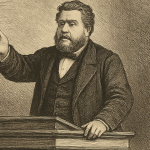The Puritan Pilgrimage
In a newspaper article from a Welsh service in Caernarfon, a striking line by Dr. Martyn Lloyd-Jones stands out like a light over the modern landscape:
“The great periods in the life of the Church, and also in the affairs of the world, have been when this life was looked upon as a pilgrimage.”
In a time when society was becoming increasingly fixated on materialism, self-interest, and the here-and-now, he pointed backward to the mindset of the Puritans and upward to the heavenly city described in Hebrews 11.
What does it mean to see life as a pilgrimage? And why would Lloyd-Jones suggest that such a view is essential for renewal, both personally and collectively?
The Puritans are often caricatured as grim-faced moralists who banned Christmas and were fun sponges. But the heart of Puritan spirituality was not all doom and gloom, it was Godward longing. They saw themselves as pilgrims in a foreign land, pressing on toward the New Jerusalem.
This was no minor theme. The Puritan mind was shaped by Scripture, particularly passages like Hebrews 11:13–16:
“These all died in faith, not having received the things promised, but having seen them and greeted them from afar, and having acknowledged that they were strangers and exiles on the earth.”
The Puritans believed that to be faithful in the present, you had to live in light of eternity. They weren’t trying to escape the world, they were trying to walk through it faithfully, eyes fixed on the city whose builder and maker is God (v.10). They read the Bible as a pilgrim manual. Their journals, sermons, and letters are full of language about wayfaring, progress, endurance, and hope. When Lloyd-Jones refers to the “great ages,” he isn’t being nostalgic for the 17th century. He’s calling the Church back to a biblical imagination that sees life through the lens of journey, not destination.
Martyn Lloyd-Jones: A Voice in the Wilderness

When Lloyd-Jones stood in Hermon Chapel that day, he was not offering theological theory but sounding an alarm. He observed that people had “lost this idea and are absorbed in the life and the world of today.” To him, this was spiritual blindness. Life had become narrow, self-centred, and disconnected from God. He warned of the foolishness of living as if the present world is all there is:
“It was the height of foolishness to think otherwise, and tragedy followed.”
He could see it: a Church dulled by comfort, a culture drifting from its moorings, a people too busy tending the fires of life to notice that the fire itself was sinking. The tragedy wasn’t just that people sinned, it was that they forgot they were pilgrims. What a powerful message that resonates with us even today! We live in the here-and-now and become consumed with the world around us that we lose sight of where our priorities really lay. The writer of Ecclesiastes 1 says it well – we chase after the wind!
No Abiding City
Hebrews 13:14 echoes the same idea:
“For here we have no lasting city, but we seek the city that is to come.”
To live as a pilgrim is to be rooted in that hope. The Greek phrase “no abiding city” (ou gar echomen menousan polin) doesn’t imply aimlessness but intentional movement. The Christian life isn’t stagnant. It’s a sojourn. And it changes how we:
- See suffering: Trials become tests of faith, not signs of abandonment.
- Handle success: Earthly achievements are not ultimate rewards.
- Engage culture: We serve our communities but know our citizenship is in heaven (Phil. 3:20).
Lloyd-Jones emphasized that we can only live rightly in this world when we’re anchored in the next. A pilgrim can enjoy life, warm his hands at the fire, but he never forgets that this world is not his home.
The Gadarene Contrast
In his evening sermon that day, Lloyd-Jones preached on the Gadarene demoniac (Luke 8:26–39). One phrase captures the crowd’s disturbing response to Jesus:
“They asked Him to depart.”
Why? Because Jesus disrupted their lives. He healed a man, a miracle! But instead of rejoicing, the people feared what His presence might cost them. Their priority was stability, not salvation. Like modern skeptics, they preferred a predictable status quo over the unsettling nearness of God. Keeping Jesus around was too risky to their business! How crazy is that, Jesus was an inconvenience!
Lloyd-Jones used this text to draw a chilling parallel: many today still want a Christ who heals, but not a Christ who interferes. The healed man, by contrast, wanted to follow Jesus. And Jesus sent him back to tell others. This, too, is part of pilgrimage: we walk the road, but we also call others to join us on it.
Recovering the Pilgrim Mentality
So what can we do to change our mindset? In a world even more saturated with distraction, convenience, and comfort than Lloyd-Jones’s day, how do we remember that we too are to live a life as pilgrims?
1. Read Scripture as Pilgrimage Literature
The Bible is full of journey language:
- Abraham left Ur.
- Israel wandered in the wilderness.
- Jesus walked the road to Jerusalem.
- The Church awaits the marriage supper of the Lamb.
These aren’t isolated stories; they form the narrative spine of God’s redemptive plan. Read Scripture with that trajectory in mind.
2. Re-evaluate What Feels Like “Home”
Pilgrims are grateful for rest stops, but they don’t build their lives on them. Ask: what have I made into a permanent structure that should be a temporary tent? Comfort isn’t bad. But it can be numbing. We need regular reminders (through prayer, fasting, reflection) that we are sojourners.
3. Revive the Language of Longing
Talk more about heaven. Not as an escape, but as a destination worth pressing toward. The early Church longed for Christ’s return. Do we? The world if full of distractions, it takes our focus away from God and onto the things that surround us. This means we miss what really matters, we need to stop chasing after the wind and instead, quiet ourselves before the Lord, looking up to Him – rest in Him, worshipping Him for who He is and who we are in Him.
4. Live Simply and Generously
Pilgrims travel light. We don’t need to swear off all possessions, but we can ask: Does this help me on the journey, or weigh me down? Generosity is a natural outflow of this mindset. If our treasure is in heaven, we’re freer to give away what we have here.
5. Tell Others Where You’re Going
The Gadarene man didn’t get to join Jesus’ earthly travels, but he got something better: a mission. Pilgrims are witnesses. We don’t just journey in private—we invite others to walk with us.

Reflections from the Road
In my job, I often encounter people who have lived full, rich lives. And yet, even the fullest life passes quickly. The things we accomplish, the comforts we pursue, the status we gain, these eventually become distant memories.
The apostle Paul’s life reminds us that it’s not death that defines a person, but the fruit they leave behind. We can chase success, comfort, and personal gain, but to what end? If it bears no eternal fruit, then what have we truly achieved? As Ecclesiastes says, it is like chasing the wind.
But if we see ourselves as sojourners, recognizing that this life is brief compared to eternity, we begin to lift our eyes. We start living not for ourselves but for God’s will, with our minds fixed on Him. And when the time comes, when the noise of life dies down and we’re left only with memory, we’ll be able to look back, not with regret, but with peace because we’ll know that we left behind a trail of fruit: not for our own legacy, but for the good of others and the glory of God.
Final Thoughts: The Fire Sinks
Lloyd-Jones referenced a poem where the cynic reflects on life’s joys but eventually concludes: “the fire sinks.” Even the pleasures of life fade. But for the pilgrim, that’s not tragedy. That’s clarity. The dimming fire isn’t the end of the story. It’s the cue to move on.
In an age that says “You only live once,” Lloyd-Jones calls us back to the ancient truth: You live now to walk with God into the life to come. May we be counted among those who desire a better country. Not as nostalgic moralists, but as joyful pilgrims whose eyes are set on the city that will never fade.
Here is the original article titled: The Puritan Pilgrimage








